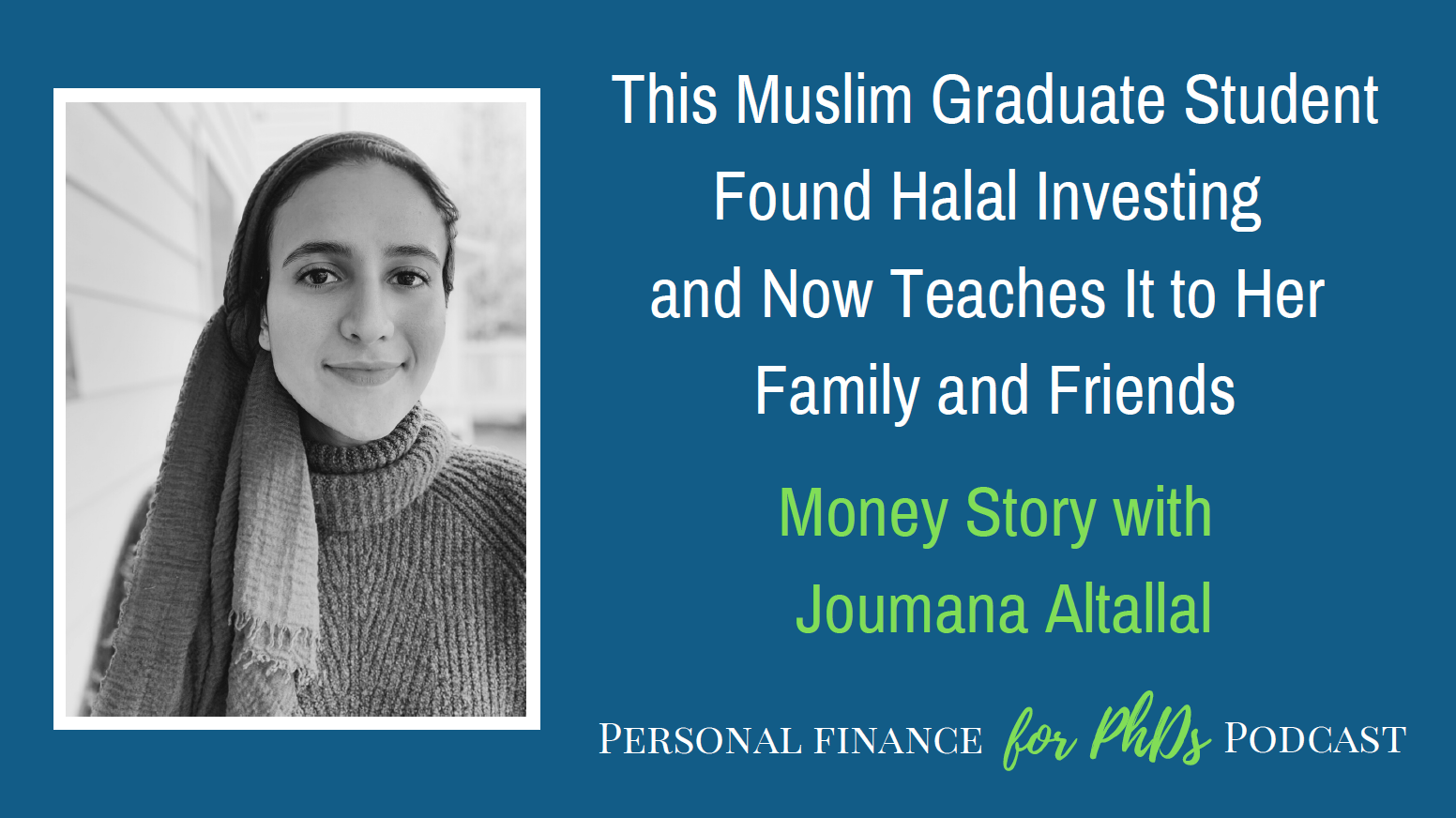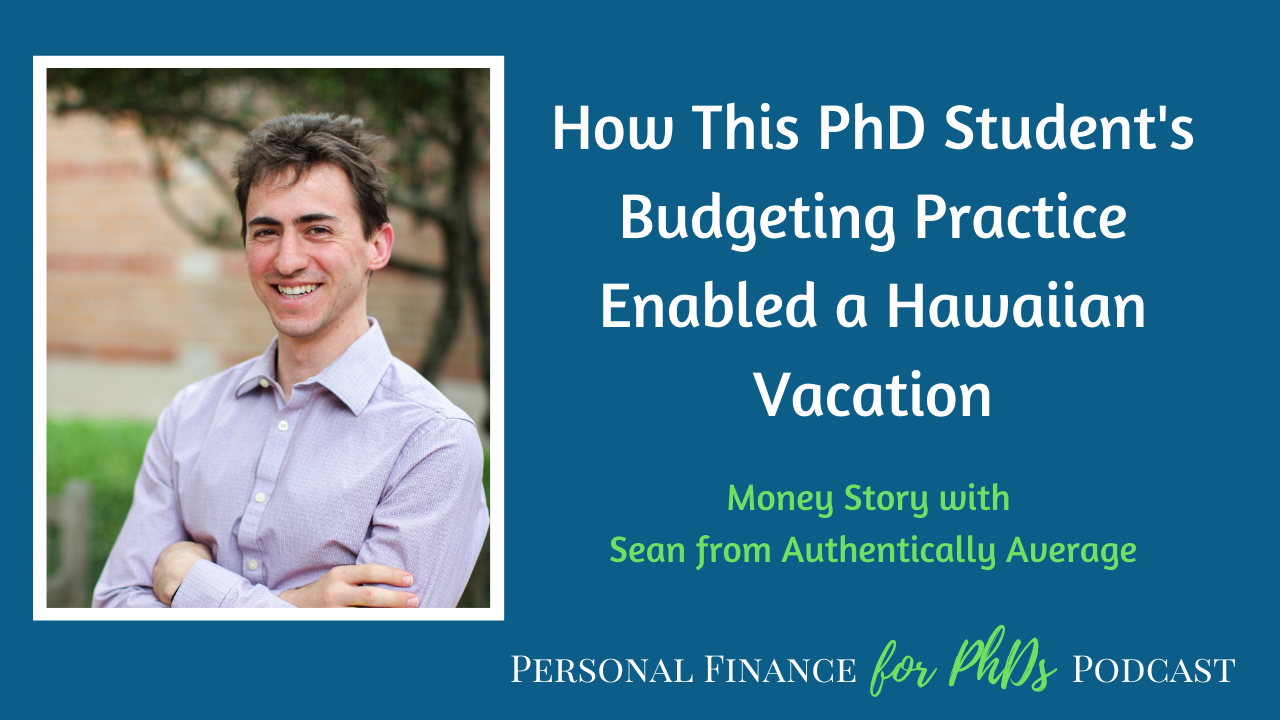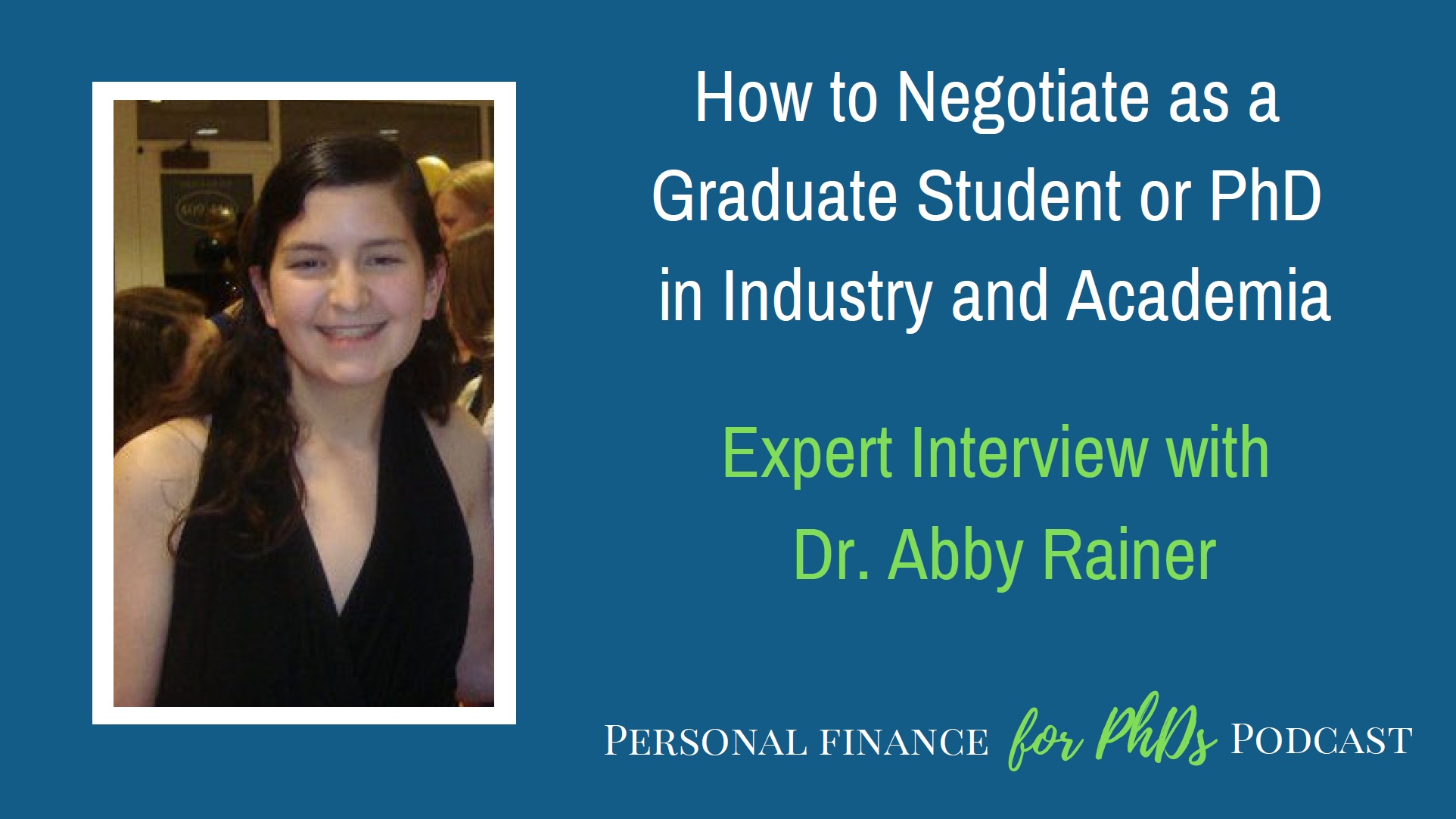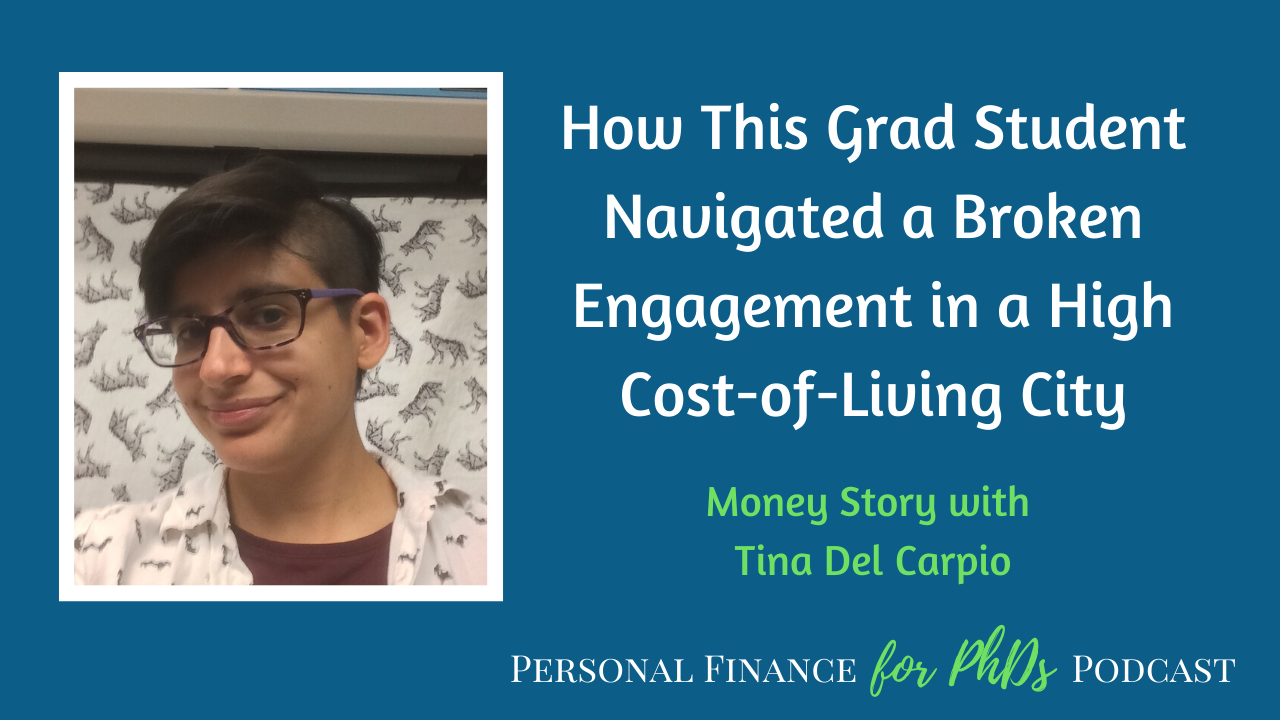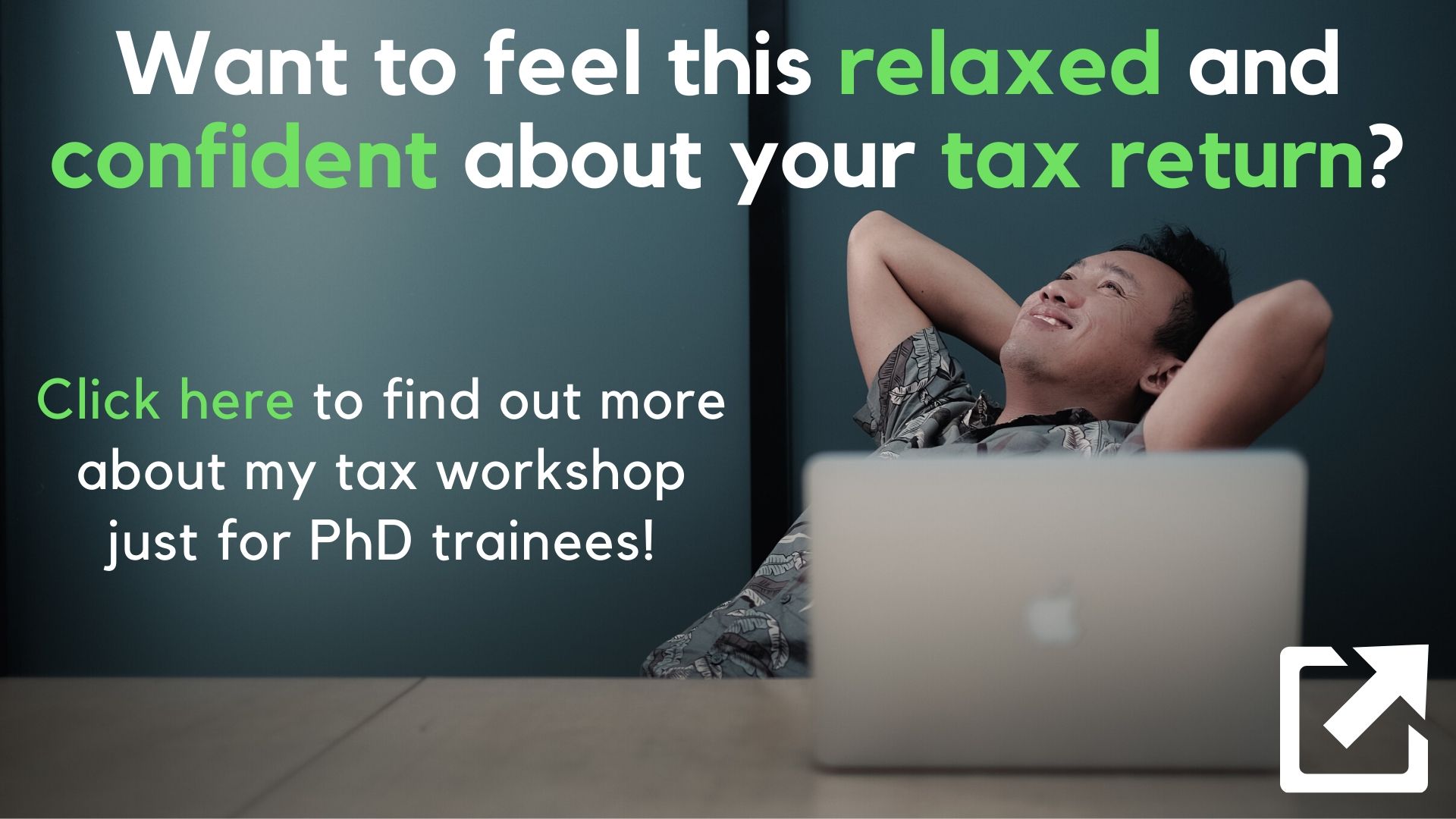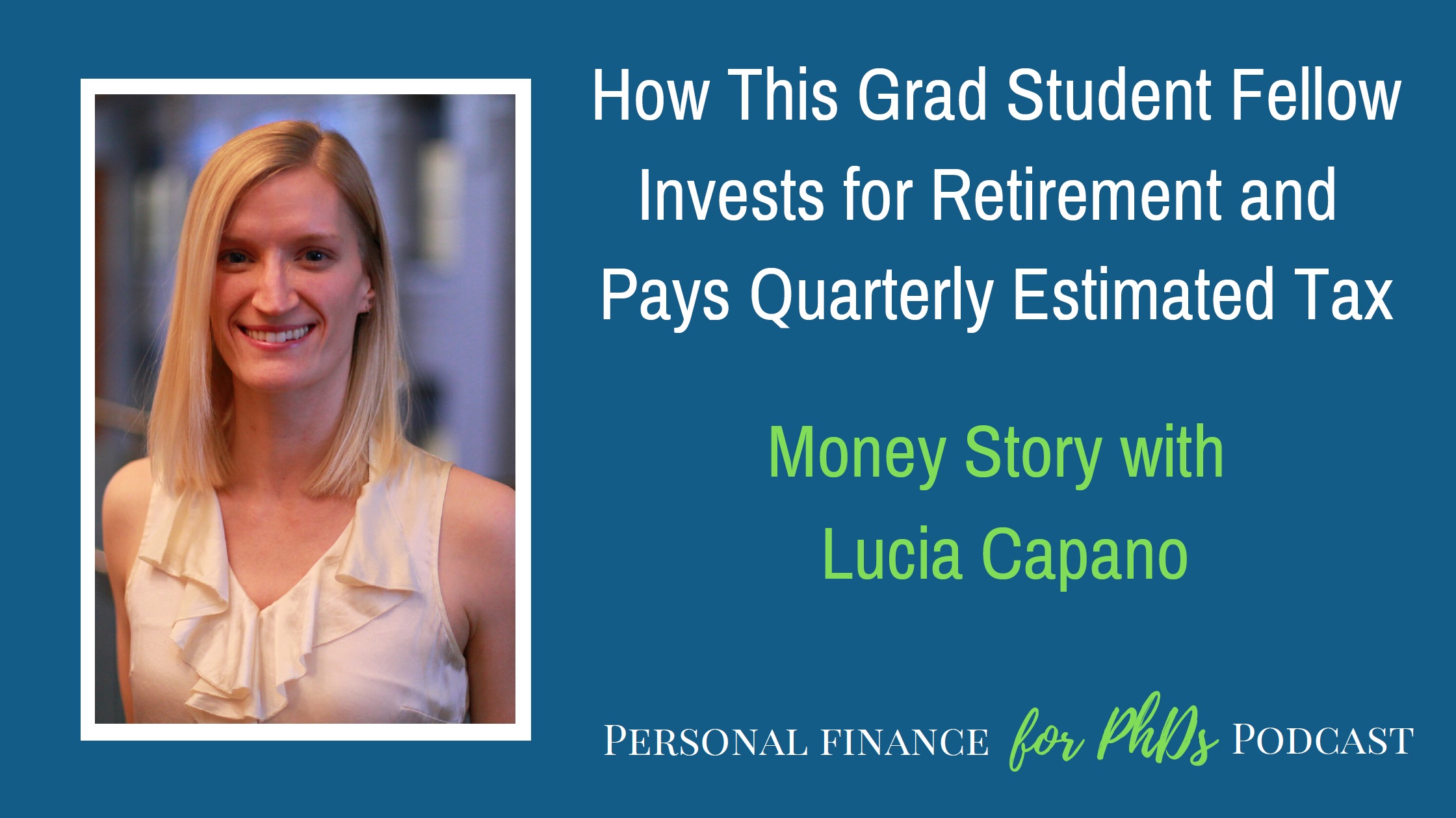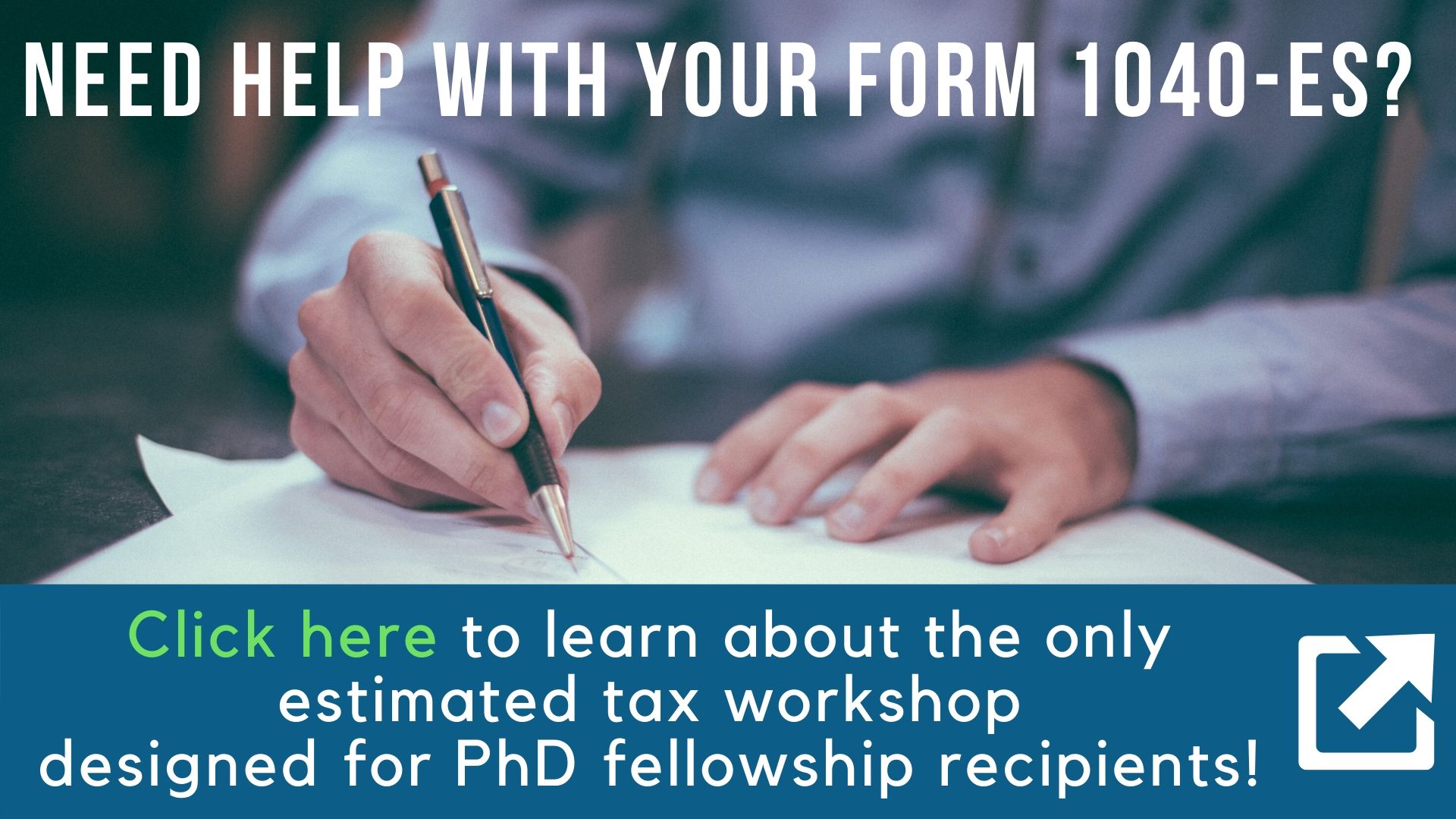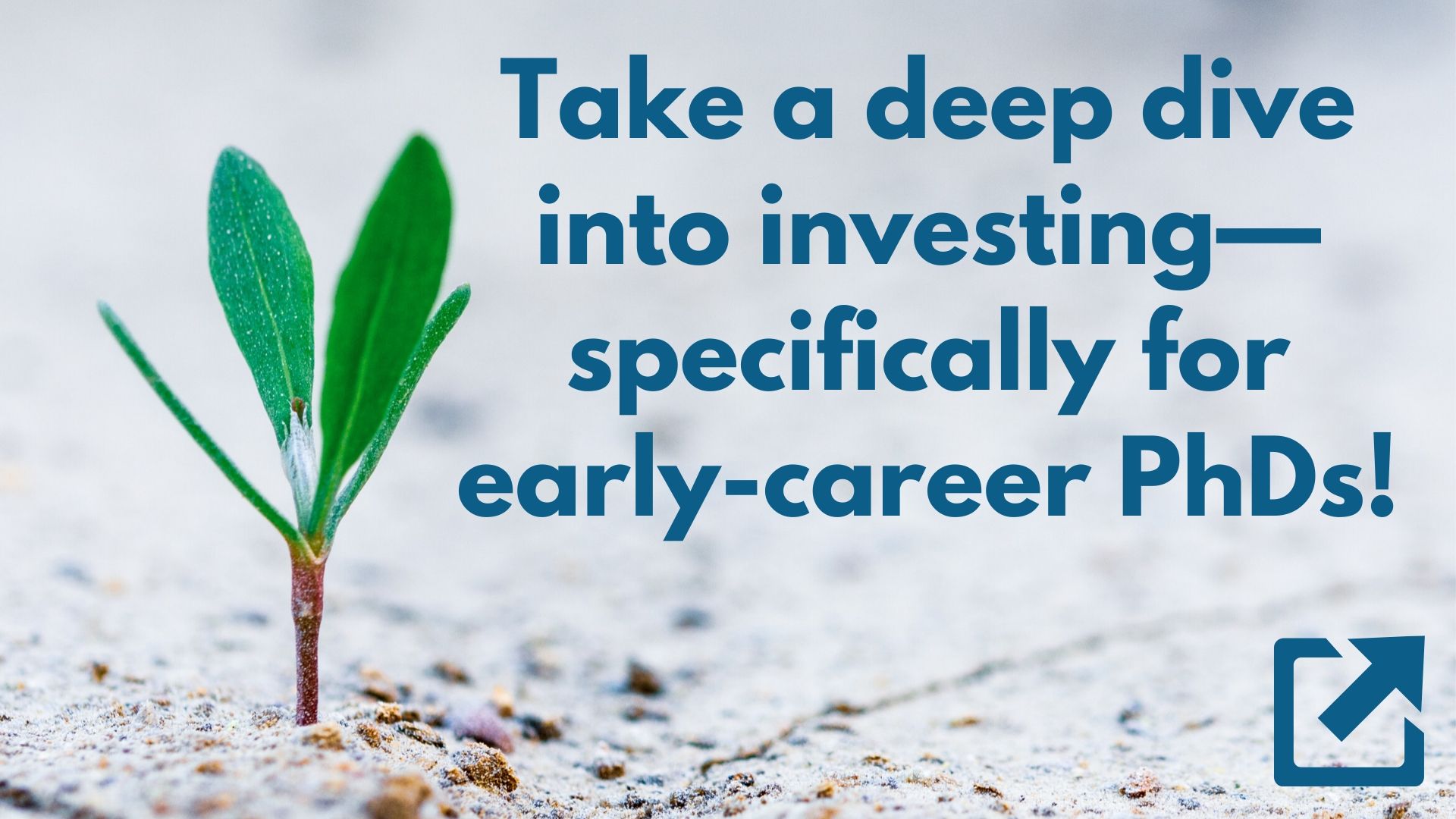In this episode, Emily interviews Rebecca Brenner Graham about side hustling to pay for her wedding while a PhD candidate in history at American University. In addition to working on her own dissertation and serving as a teaching assistant, Rebecca used her skills as a history researcher in a self-employment position assisting an economics professor at another university. Rebecca had to quickly learn how to manage her time and energy well across all her different professional roles and her personal life. If you are planning a wedding as a graduate student, you’ll also enjoy hearing wedding planning and budgeting tips from both Rebecca and Emily.
Links Mentioned
- Find Rebecca on her website and on Twitter
- Personal Finance for PhDs: Community
- Personal Finance for PhDs: Podcast Hub
- Personal Finance for PhDs: Subscribe to the mailing list
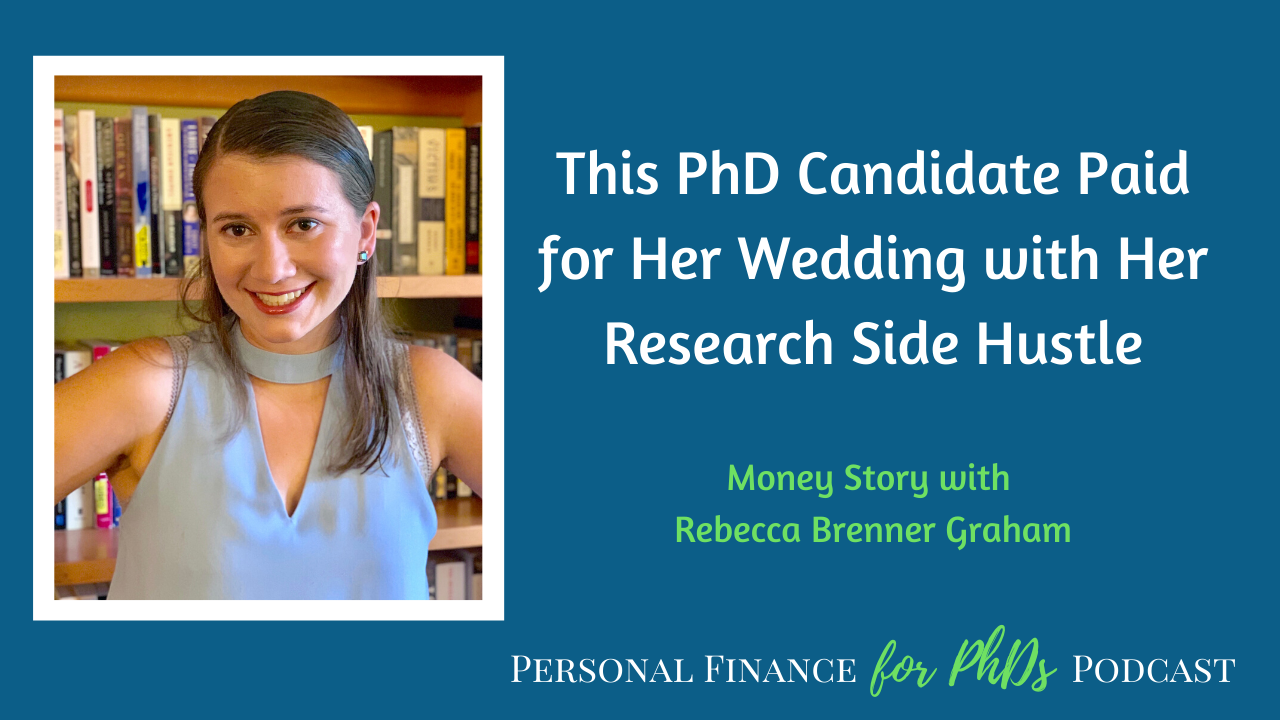
Teaser
00:00 Rebecca: The piece of advice that I’m just learning and wish I had known sooner was that unpaid opportunities are almost always not worth it. Full stop.
Introduction
00:20 Emily: Welcome to the Personal Finance for PhDs podcast, a higher education in personal finance. I’m your host, Dr. Emily Roberts. This is season six, episode 14, and today my guest is Rebecca Brenner Graham, a PhD candidate in history at American University. Rebecca has always side hustled to supplement her stipend, but she kicked it up a notch in her fourth year to pay for her wedding. We discuss how Rebecca balanced her time and energy among her own dissertation work, her teaching assistantship, her self employment gig as a researcher for an economics professor, wedding planning, and the rest of her life. Listen through to the end here, how Rebecca’s wedding went and some wedding planning tips from both of us. Without further ado, here’s my interview with Rebecca Brenner Graham.
Will You Please Introduce Yourself Further?
01:07 Emily: I am so delighted to have joining me on the podcast today Rebecca Brenner Graham, who is going to be discussing with me, her wedding, her recent wedding, and how she ended up paying for that on her Grad student stipend, and actually on more than just her grad student’s stipend. So Rebecca, thanks so much for joining me on the podcast today and will you please tell us a little bit more about yourself?
01:27 Rebecca: Thank you so much for having me, as I was telling you. I’m a long time listener and it just occurred to me that I might have something useful to add. I went to college at Mount Holyoke in Western, Massachusetts as a women’s college. There, I double majored in history and philosophy, and then I went straight into my history graduate school. I’m now starting my fifth year of the PhD. I was able to do the public history master’s combined with my doctoral coursework, which is one of the reasons that I love my department at American University. My dissertation, if anyone’s interested in that, is on Sunday mail delivery from 1810 through 1912 as a lens into religion, state relations. Because I got my masters in public history, I’ve also had some museum gigs on the side, on top of working as a TA in the American University Department of History. That’s about it.
Side-Hustling as a History PhD
02:27 Emily: Yeah. Is that typical for people in your department to be taking on museum jobs or outside gigs like that.
02:33 Rebecca: It’s typical in the sense that being atypical is typical. So there’s not one way to do it. There’s not one way to make it work. Like one of my classmates does a bunch of oral histories of basketball players for money. Some of them are like older and married or have houses. For me, especially brcause I came straight from undergrad, in order to have enough money to not be worrying about it constantly, I have had part time work every year on top of the TA-ing.
03:06 Emily: Okay. That’s good to know. So basically what you’re saying is the stipend that you’re receiving is not sufficient across the board. No one is doing this on just the stipend. They either have outside sources of income from a spouse or something, or maybe past savings, or they’re currently taking on side hustles. Right?
03:22 Rebecca: So I can think of two classmates who, and this is not a coincidence, they’re the two in the department that are younger than me, that haven’t had that much part time work. One of them is extremely frugal and the other one decided to take out loans on top of the stipend. I adore my department, like I am so happy to be there, at the same time we do have the second lowest stipends of all history departments in the greater DC area.
03:49 Emily: Okay. Yeah. Glad to hear that balance of like, Hey, it’s worth it, we’re doing it, but this is what it takes to get it done. Side hustling for you, other solutions for other people, but glad to hear that.
Getting Engaged During Grad School
04:01 Emily: Okay, you’ve given us a little bit of a brief career history, coming straight from college into graduate school, doing your master’s and PhD right in a row. Where does your relationship factor into this?
04:12 Rebecca: Going way back for a second, we actually met in a summer program in Washington, DC when we were 16, like for high school students. We ended up at college near each other. His name is Brandon, and Brandon went to UMass Amherst. We were together for the first half of college, and then we broke up, just seeing other people, didn’t think or know that we’d get back together. We ran into each other a couple of years later and the summer after graduation, we ended up getting back together. Then six months after that, he moved from New York to DC in order to be with me. And even before Brandon and I got back together, I had to facetiously told friends that I need to pass my dissertation proposal, even before I get an engagement proposal. And this was even before I was in a PhD program, this is when I knew I wanted to do a PhD.
05:04 Rebecca: So third year of graduate school, toward the end of the year, I was about to become all but dissertation, ABD, and we had already gone ring shopping. I thought we might be getting engaged soon. And then I ended up getting engaged a few weeks before my prospectus defense. So at the end of my third year of grad school, I was ABD and also engaged.
05:30 Emily: Yeah. I really love that you were, I know you said facetiously, but you were thoughtful about this, right? You had an idea of how you wanted your career to play out and also how your relationship, whoever that was with, how you wanted that to play out. And it’s good to hear really that, um, your husband made that sacrifice when he was your boyfriend of moving to where you were so that you could prioritize your career and he was going to figure it out and it’s not necessarily common story. I’m really glad to hear that.
06:00 Emily: I’m reminded of when I got engaged which was also during graduate school. My husband, we had sort of decided together that we were going to get married, moving towards that direction, but he wanted to wait to propose until he also achieved candidacy. So I was further away from that. That actually didn’t happen for me until my fourth year of graduate school, I think, just the way my department works. But he was like, no, I got to get, I have to get my prelims out of the way, and then I can think about the engagement. So he had the same thought process as you, but from the opposite perspective, in our case.
06:34 Rebecca: I think it’s an autonomy of time thing because even if it’s the same work across the board, you have, I think in most programs, you have more autonomy of time after that ABD mark.
06:45 Emily: Yeah. I think for my husband, it was that, but also just the stress of preparing for the prelim and writing whatever he had to write and doing whatever we had to do, like oral defense or something, I don’t remember the details for him, but just to get past that stressful thing, he wanted it off his plate, so he could enjoy the process of being engaged and planning the wedding and not having to juggle those two things simultaneously and know that, yeah, there’s going to be a few more years here until we have to repeat that process for the dissertation and ultimate defense. With respect to your actual timing of your wedding, like how long were you guys engaged for?
07:25 Rebecca: We got engaged in March, 2018. For about a month, we were actually planning with my parents, and my mom in particular is quite traditional and they were generously willing to pay for it, but it became clear, especially to me very quickly that coordinating with them and negotiating priorities was more labor, and especially more emotional labor, than actually making money myself and working towards paying for it. We also decided in between that March and April period that the things that we cared most about relating to our wedding were not that expensive. Like making the ceremony go how it was important to me was a higher priority than venue or the number of people who were coming. So eventually, I guess around April, when we started planning and paying for it ourselves, we got a date on the calendar. We got married a year and I guess two or three months, not great with numbers, I guess a year and three months later on June 30th, 2019.
08:43 Emily: Okay. So yeah, we are recording this in August, 2019, so this is really fresh for you and that’s exciting. This is definitely a tip for other people who are going into the wedding planning process of anyone who contributes gets a say. If you don’t want that party to have that say in that particular way or whatever, if there are strings attached to that gift, sometimes it is easier to simply take on all of the finances on your own. That’s the decision that you made.
Paying for the Wedding through Side-Hustling
09:12 Emily: We’ve already kind of gone over that your stipend was not really enough to live on, at least in the lifestyle that you want, and you were already side hustling. Did you have a plan for like how much more money did you need to bring in either in total or on a monthly basis to be able to pay for the wedding?
09:28 Rebecca: We looked at it a little backwards, in retrospect. It was more like however much money we have to delegate toward this, that is how much that we could pay. Brandon and I split it almost exactly evenly between us with a few exceptions. If there was something that was really important to him or really important to me. I paid for Ketubah the Jewish marriage contract. I paid for our pre rabbinical counseling. He paid for our entire rehearsal brunch because that was not something that I was tied to doing. On my end, my stipend from American when I started was $19,000 per year, and now currently thanks to our union it’s $22,000 per year, which is actually a huge difference just in the four years or whatever that I’ve been a TA. I really didn’t give it that much thought about, will I be able to afford this? It was more if I can’t afford it, then I won’t do it, and we love each other, and we want to get married, and that’s the most important thing. I have another classmate in my program who literally eloped at one, but I don’t really know the details on that. Also around this time, I was reading those books by Jen Sincero, have you ever read her books? The first one is called “You Are a Badas” and the second one is called “You Are a Badass at Making Money” and they’re —
11:00 Emily: Actually, I’ll interrupt you just for a second. I literally just finished “You’re a Badass At Making Money”, like last week. So I’m a little late to the Jen Sincero game, but I did read it and enjoyed it. I’m trying to figure out what I want to incorporate. So yeah, please go on.
11:15 Rebecca: Oh, that’s so exciting. I’m glad you liked it. In spring 2018, this was when her money book came out, the green one. She’s a little bit more, I don’t know if the word is capitalist than I am, but she’s also in line with my feminism. A central takeaway from Sincero’s work is that sometimes you have to jump and then create the net for yourself. That’s what happened when we decided to pay for our own wedding. So around the time that we had made that decision, I was reading a bunch of Jen Sincero. A major advantage of doing a history program in DC is that a lot of people email the department to offer work opportunities. So then in May, 2018, I heard about a summer job working for an economics professor at George Mason to do research on 19th and early 20th century labor history. My dissertation is on 19th century and early 20th century religion-state relations, and there was a lot of overlap with that labor history. I ended up working for her over the summer and then she offered for me to stay for the coming school year, like this past school year 2018-19. My advisor helped me negotiate a 50% salary increase for that, so that was my side gig that took a lot of time and essentially paid for my wedding. But it was also a completely pleasant experience working for this economist.
12:55 Emily: Yeah. I want to hear more about the logistics of how this side hustle worked. For you with American, because you’re a TA, does that mean that you’re not working/not being paid over the summer?
13:07 Rebecca: Oh yes.
13:09 Emily: Okay, so you’re already dealing with an academic year only stipend. So —
13:13 Rebecca: Last year I had a fellowship from my department for summer research. This year I did not, which was my why my reaction was “Oh yeah”, because that was the situation. But last summer I had a $3,500 fellowship from my department and then $5,000 from this professor George Mason.
13:35 Emily: Okay, so in your summers, at least last summer, you had a balance of working on your own dissertation and also doing this other work for this other professor, but I’m wondering, because you guys are at different universities, what was the actual relationship between you and this professor or the grant? Were you a W-2 employee or was this a self-employment situation?
13:58 Rebecca: It was a self employment situation, so I got taxed on it pretty heavily.
Researching as a Side-Hustle
14:04 Emily: Yeah. So that’s definitely a couple of things I want to talk further about with that, because I don’t really know that well, how this works. I think you’re the first person I interviewed for the podcast who has done research, like very similar skill set and everything to what you’re doing for your dissertation, and as a graduate student, but as a self employment project. Can you just talk to me a little bit more about what the differences are between that self-employment gig and maybe what you typically do as a graduate student?
14:36 Rebecca: In terms of the content itself, it was really just teaching versus researching. This past year I TA-ed class about the presidents and then I TA-ed History of Memory, and that whole time I was researching 19th century labor history. The biggest difference in terms of how much it affects me is that the side gig did not withhold any taxes. So as a graduate student, I’m cobbling together a bunch of opportunities to approach like 40[K per year, which is really great for grad school, I paid $4,000 in taxes last year, and that was most of my money.
15:23 Emily: I’ll make a couple elaborations on that for anyone who is looking into self-employment, which, if you’re going to do a side hustle, I kind of think self-employment is the way to go, because you have a lot more control over your schedule over how much you’re going to work. But the flip side of that is you have to take a lot more responsibility yourself when it comes to the financial side of things. One of the main things is that you need to pay a lot of tax and no one is withholding that tax for you, so two notes there. The first is that, with self-employment stuff, it’s not like income tax and you know that, so I’m speaking to the audience, but it’s not like income tax where you’re not taxed on the first chunk of income you take in, then you’ll have a low tax rate on the next chunk, then you’ll have a higher tax rate on the next chunk. That’s the graduated income tax system. You will still pay income tax as a self employed person, so just add that on top of whatever the rest of your income is. It’s going to be in the 12% or maybe even the 22% bracket, depending on how much money you make. But in addition, you have self employment tax, which is, I believe 15.3% on everything. The first dollar that you make as a self employed person, 15.3% of everything. So it’s not like that graduated system. It ends up feeling like you pay a lot and you do pay a lot in tax because of these two different types of tax that you end up paying income tax and self employment tax.
Emily: For anyone who is making a significant self employment income like you did, you have to set money aside for tax. You have to prepare for that. You have to do the calculations because you don’t want to be surprised at the end of the year with…I mean, you can be very pleased that you made all this money through selling employment, that’s amazing, but you have to be prepared for the tax side of things. One thing I’ll recommend actually for anyone who is either self employed or who has a fellowship who doesn’t have income tax withheld, I have resources on my website about paying quarterly estimated tax. You can go to the site and search for quarterly estimated tax. You’ll come up with like my main article on that. It’s designed for people who have fellowship income, but people with self employment income can take a lot out of that as well. And if you want a little bit further help I’ll link from the show notes, actually have a workshop on helping people pay quarterly estimated tax. Again, to not be surprised at the end of the year with a huge tax bill. It helps you estimate the amount of tax you’ll have to pay and also pay through it quarterly.
17:37 Emily: Okay, so Rebecca, that was a little bit of a diversion just because this is my wheelhouse about taxes.
17:41 Rebecca: That’s very helpful. Yeah.
17:44 Emily: I actually was a little bit for curious, because I think what I was asking, I didn’t phrase quite right earlier, was about, so the difference between your dissertation work, which you are either receiving a fellowship for, or maybe not being explicitly paid to do in your primary role as a graduate student versus the self employment relationship, this contractor relationship you have with this professor. I guess what I’m asking about is like intellectual or academic ownership over that work. Are you going to be on papers? Just because it’s an unusual way to be doing research, as a self employed person, but still in an academic setting, but it’s at a different university. So that’s why it was sort of interesting and complex.
18:24 Rebecca: I find it to be really common, particularly in Washington DC where we have a lot of federal archives. Since I started grad school in 2015, I’ve honestly lost track of the number of professors who’ve emailed the department literally from as far as Australia and asked our grad students to do work for them. Now I don’t do it unless it’s $30 per hour, but I used to do it for like $12, $15 per hour before I knew better. And as far as I know, we never get even an acknowledgement because we’re a human in the right location who has used archives before, and isn’t going to mess it up when researching.
19:12 Emily: Gotcha.
19:13 Rebecca: For my dissertation, I am the author.
19:16 Emily: Right. So it’s really just by virtue of where you’re attending graduate school and the skill set that you have,that you have access and people, as you were saying from all of the world want some access and they’ll use you, hire you to be a conduit for helping them with that work. But in terms of the academic ownership, because you’re being paid and again, as a contractor, it sounds like you sort of relinquish that. They’re going to be completely in control of the scholarship side of things. You’re not apparently even getting an acknowledgement, which I feel like it definitely deserves an acknowledgement at minimum, but okay.
19:50 Rebecca: That’s just the random people from California or whoever who can’t fly into DC.
19:54 Emily: Yeah, totally. Okay. So now I have a better idea about this.
19:57 Rebecca: It’s not even taxed sometimes, because it’s not enough money to be taxed, but I’ve done that a lot of times. And then my research gig at George Mason, I have a relationship with this person now. I don’t know when her book will be done, but I’ll be in communication with her. And I definitely felt like I was a part of the project, even though for the argument of the book, that’s entirely her argument, I’m just providing the facts that she then integrates into her analysis.
20:29 Emily: Yeah. I guess I’m also wondering like maybe you know for her situation, why wasn’t she working with a graduate student at our own institution? Like her advisee or something like that.
20:39 Rebecca: She wanted a historian. She’s in an economics department and she specifically reached out to history departments because she wanted reviews of historical literature by historians. And then also just that change over time analysis that my department trains me to do.
21:01 Emily: Gotcha. Okay. Yeah. This is really, really interesting to me.
Commercial
21:06 Emily: Emily here for a brief interlude. I am just bursting with this news. I have launched a community for personal finance for PhDs. The community is for PhDs and people pursuing PhDs who want to level up their practice of personal finance by opening and funding an IRA, starting to budget, aggressively paying off debt financially navigating a life or career transition, maximizing the income from a side hustle, preparing an accurate tax return, and much more. Inside the community, you’ll have access to a library of financial education products I’ve made in the past, and I’m going to add new trainings that library every month. There is also a discussion forum, a monthly live calls with me, a book club, and progress journaling for financial goals. Basically, the community is going to help you reach your financial goals, whatever they are. Go to PFForPhDs.com/community to find out even more. If you’re listening to this in real time, you have the opportunity to become a founding member of the community at a discount. The price is going up on August 15th, 2020, so don’t delay. Go to PFForPhDs.com/community for all the details. I can’t wait to help propel you to financial success. Now back to the interview.
Research Side-Hustles and Career Advancement
22:29 Emily: I guess the other sort of big picture question I wanted to ask you about side hustling is, so the side hustling is necessary financially — for the wedding, for living your life — do you think it’s giving you more than that? Like is this actually advancing your career in some way?
22:46 Rebecca: That’s a fantastic question and I really hadn’t thought about it. I mean, the economics people at George Mason, like their department is a completely different environment than mine, so it’s educational, just in that sense to meet more people in different places. Overall, the research work definitely was not expanding my skillset. It probably expanded my content knowledge a little bit, but it wasn’t that much more than whatever I had to be familiar with for comprehensive exams, because I did all of that time period. For the George Mason people I earned, what was it? For the whole year it was $15,000. And the previous year, before I was engaged, my side hustle, during my third year of graduate school paid $1,500, so literally take off a zero, and that was writing an exhibit for a museum. That was fantastic experience that definitely advanced my CV/resume and what I know how to do.
23:56 Emily: Gotcha. So there may be a little bit of a trade off there. This is not surprising that the things that benefit you more as an individual, there may be a trade off on the money there. You’re being paid more, but —
24:06 Rebecca: In my experience, that is correct.
24:08 Emily: Yeah, so I mean, hopefully that’s not the case. I wish for everyone to have a side hustle that pays really well and advances your career and all that, but sometimes you may have to trade off one or the other, but it sounds like at least at the very, very minimum you’ve expanded your network, right? You’ve met more people. You’ve worked closely with this one individual. So maybe that’ll come into play later on. Who knows about that.
Time Management and Side-Hustling
24:31 Emily: So I want to move now to talking about how you, how you manage your time. You’re obviously a long time side hustler, but it sounds like you really maybe stepped it up, maybe stepped up your hours to make this additional money in this past year to be able to fund the wedding that you wanted. Can you talk to me a little bit about how you balanced your dissertation work, your TA role, the side hustle, maybe multiple side hustles, if you’re still doing other ones, and then of course, just the rest of your personal life.
24:59 Rebecca: I have noticed for a while that it comes down to two things. One is time management, which I’m sure seems pretty straight forward. And the second is the kind of energy that the opportunity is giving you. I have felt for a long time, this is also just my personality, that if an opportunity is giving me a lot of positive energy and genuinely feel like I can do anything, but if it’s not, and sometimes things take away from my energy, then that becomes a real challenge. I remember at the beginning of last school year, last fall, actually around this exact time, last year, I majorly had not figured out how that balance was going to work. I was so stressed that I ended up giving up caffeine for several months, even though coffee is my favorite thing, because I was just so energized and stressed all the time that it was just miserable. And just not knowing how I was going to balance my time all year.
26:03 Rebecca: Also, the way that we ended up doing our wedding, and I’m sure we’ll talk about this later, it ended up working out great, but we accepted a lot of favors from people. Like a friend did the photography, a friend did the flowers, a family friend officiated our service. And when you rely on people, even if they’re really close friends and family, it’s just really stressful to maintain the relationships. I never wanted to feel like I was a burden on people. That created a lot of stress and the most challenges very early on, but over the course of the year, I think I just adjusted. Also second semester, I had this past TA assignment for a fantastic, really supportive enthusiastic professor. She’s Eileen Finley at American University and she was just a breath of fresh air twice a week, and that made a huge positive difference in my ability to find positive energy and manage my time well.
27:08 Emily: I think that’s an excellent, excellent point that you’re making. I wonder to make it any more applicable for the listener, can you tell in advance what kinds of activities are going to give you energy? So you can kind of filter, like I’m not gonna accept this opportunity because it seems like it’ll be draining. Have you figured out any kind of framework around that or is it just have to try it and then see?
27:31 Rebecca: I’m definitely not an expert on that in the sense that I am still figuring that out. So this is not what you asked, but I could break down what an average week was like. I think both semesters my TA at AU, that was Tuesday and Friday, so then I would often go to George Mason where they gave me a desk, which was nice. And that way I felt like I had community there. I almost always went once a week. I didn’t go more than once a week, very often, but it was typically on a Monday, Wednesday or a Thursday really. And then one or two days I would actually get to do my own work on my own dissertation. And I ended up, um, drafting one chapter out of six first semester and one chapter out of six second semester, but I really have much higher hopes for this coming academic year when I’m not planning and paying for a wedding. I hope to be able to draft more than one chapter each semester.
28:31 Emily: That actually does sound like really good progress to me. I take it you are going to take the side hustle down some. You’re not trying to make as much money in the upcoming year as you did last year.
28:41 Rebecca: I ended working for George Mason at the end of the school year, because it was an academic school year position, but also during second semester, I allocated some time toward applying for fellowships just because everyone told me that that’s what you do when you’re going into fifth year. I actually got three out of four of the ones that I applied for. One of them is through the same people at George Mason, so that ties into what you said about like making connections helps. One is from Mount Holyoke College where I did my undergrad work. It’s specifically from the history department. There that’s the biggest fellowship. They’re basically paying my rent for the coming year. And that will hopefully really allow me to focus on my actual dissertation work. Then the third is a research grant from my department at American. I’m really trying not to take on side hustle work like I did last year. Though, I did have a potentially paid opportunity fall into my lap for this coming year, but it hasn’t fully developed yet and I need to prioritize my dissertation because I wasn’t always able to work on it as much as I wanted to this past year.
29:58 Emily: Yeah. Congratulations on winning those three fellowships. Are you continuing to TA in addition to accepting those fellowships?
30:05 Rebecca: This coming year is my last year of TA-ing.
30:08 Emily: Yeah, it’s a great point for anyone who is looking to side hustling during graduate school and especially for you where your progress on your dissertation is up to you. You’re ABD, it’s at your own speed. There is a danger of devoting too much time to making money on the side and not enough time to actually progressing through your current career stage so that you can get a full time job and have an actual salary.
30:33 Rebecca: It’s a balance to strike for a few reasons. One is I get the most work done when I can take myself out to the pizza place next to my apartment and buy my favorite pizza, or get coffee and a bunch of different coffee shops, or buy a nice new planner for myself to organize my life. You have to have some cash flow, at least in my experience in order to be your best student.
31:00 Emily: Gotcha.
31:01 Rebecca: And I think the other reason is that I actually want to go into public history and museum work rather than academia. So in order to get more relevant job experience, that’s also a balance to strike for me.
The Financial Side of Wedding Planning
31:15 Emily: For sure. Yeah. Thanks for pointing that out. So we’ve been talking about the side hustles and the wedding you added, you know, $15,000 to your wedding fund. It sounds like more or less for this past year and it just was a month or so ago. So how was it, how did the wedding go?
31:30 Rebecca: We got married at the Hamilton Restaurant in downtown Washington, DC. It’s around the corner from the White House and it’s both a restaurant and a concert venue. And I would highly recommend to anyone looking to have a great wedding at a minimal cost to get married at a restaurant that has a concert venue because under one contract we had our venue, the food, they provided the cupcakes, they included the open bar. There was a guy that was — so, I thought we had a lights guy and then a sound guy, and I just realized when I was telling my husband about this interview, that those were actually the same person. So it came with a lights guy and the sound guy. The venue was really great.
32:18 Rebecca: I was really happy with my dress. I found it for $130, which I’m really proud of. One of my bridesmaids asked me what I was envisioning and I described sort of a shorter dress, but also a sun dress, but also beautiful. And she pulled up one on Pinterest and was like, “do you mean like this?” And I was like, “yes, that’s exactly what I’m looking for.” Then, a few days later she texted me that it was 75% off online. So that’s how I got my dress from $130. A different bridesmaid took me veil shopping and I got one for $30. I would say for any brides out there, don’t spend a lot of money on the veil because you’re only going to wear it once. One of my aunts bought my shoes for me at Macy’s or something as a gift.
33:09 Rebecca: The most important part of the whole wedding experience to me was the ceremony and it’s hard to describe why that is. I guess, I mean, it’s a Jewish life cycle event and I did not have the traditional bat mitzvah, but I identify very strongly with Judaism, and my husband’s one of his parents is Jewish, but he didn’t grow up with a lot of religion, so I would describe it as Jewish with an interfaith twist. The way I think back on our ceremony is that there are a few events in life that are really deeply, very important, and for one of those to go so well, I appreciate that it went flawlessly so much. I think the ceremony itself, which we have a link to the video, actually that I can send you if you’re interested, I’m just so happy with how it went. We had a family friend officiate and play guitar and sing. My cousin, who is also a bridesmaid, did the Hebrew. An aunt and uncle made our chuppah for us as a gift to us. My dad sang a song during it, actually. It was like everything I could have imagined, and I’m so grateful for that, and we made it happen ourselves.
34:31 Emily: Yeah, that’s something to be really, really proud of, obviously. What I’m hearing, as someone who has also planning a wedding, is that it sounds like you DIY-ed, in terms of accessing your community and asking people to contribute, the parts of the whole experience that were most meaningful to you, but also the ones that their contribution was particularly, again, meaningful or personal, like singing a song, for example. And also not particularly a ton of work, versus your choice of venue, where you combined the restaurant and the venue and all the staff is there and everything is, as you said, under one contract. That was a way that you made a really simple decision that made the planning a lot, lot easier. I did the opposite thing with my wedding, so I know that it’s a lot of work and a lot of money to do things the other way. So anyone who’s thinking about planning a wedding, I think that you went about this in a very positive and thoughtful and way that paid off, it sounds like, really well.
35:34 Rebecca: What was your wedding venue, if you don’t mind me asking?
35:36 Emily: Yeah. So we had two, first of all, because one, we got married in the church and two the reception was at a different location. So it’s already dealing with two different locations, right? We actually had our reception at a museum of natural history in Raleigh, North Carolina, which was awesome.
35:52 Rebecca: I’ve been there, actually.
35:55 Emily: Yes, it’s a fantastic museum. I was so excited. I grew up outside DC, so I’ve been in love with the natural history museum as part of the Smithsonian forever, so to have a chance to do that in a similar museum in Raleigh was so much fun. The venue was really, really fun, but it was an outside caterer. It’s a lot of work. Rentals were a whole separate thing. Getting it all done in one place, I think, was really smart. It saves a lot of time, saves a lot of money. And as I said, then you chose to DIY the parts where people could actually really contribute instead of, for example, asking for people to contribute on the food or, you know, there’s other ways to do this kind of thing that could be a little bit more work for everyone rather than just, oh, I’m giving you this wonderful gift of a song or the shoes or whatever it turns out to be. I appreciate hearing that. And it sounds like you had a wonderful time and I’m happy that everything worked out with the side hustle and everything. Any final comments on the wedding and the side hustle?
36:50 Rebecca: Just a quick, funny thing that came to mind is that one of my closest friends who did our flowers, she was literally a few days away from getting her doctorate. Her name’s Arlisha and she got her doctorate in history a few days after my wedding. Her final year of dissertating, she literally texted me and was like, I’m taking up flower arrangement as a hobby while I finished my dissertation, can I do this for your wedding? And I had not previously cared about the flowers, but I was like, yes, if you want to, go for it. She did an amazing job. Just the aesthetics of the room, I think looked so much better because Arlisha’s dissertation side hobby was flower arrangement.
37:34 Emily: Yeah. I think in the academic space, we talk a lot about mental health and self care and so forth, and that’s a really fun, healing, stress-relieving thing to potentially do that, hey, can also help out a friend or even become a side hustle , if you want to. I had an interview recently with someone who decided to turn her baking hobby, as a graduate student, into a business. So it’s the same kind of thing, right? You have something you enjoy doing, it’s a stress reliever for you, why not turn it into something a little bit bigger?
Final Words of Advice
38:02 Emily: Final question here, Rebecca, which is, what is your best financial advice for another early career?
38:08 Rebecca: The piece of advice that I’m just learning and wish I had known sooner was that unpaid opportunities are almost always not worth it. Full stop.
38:20 Emily: Yup.
38:20 Rebecca: Also, as a PhD student, you have to do your doctoral requirements and dissertation, but there’s really nothing else that you have to do. And if you have different wedding preferences from your parents, just do it your own way. And if some customs from your religion are meaningful, just stick to those. If others aren’t…our wedding was really a growth opportunity for me and I’m proud and thankful for how it went.
38:50 Emily: Wonderful. No need to elaborate any further on that, Rebecca. Thank you so much for sharing the story on the podcast with me.
38:56 Rebecca: Thank you so much.
Outtro
38:58 Emily: Listeners, thank you for joining me for this episode. PFforPhDs.com/podcast is the hub for the personal finance for PhDs podcast. There you can find links to all the episode show notes, and a form to volunteer to be interviewed. I’d love for you to check it out and get more involved. If you’ve been enjoying the podcast, please consider joining my mailing list for my behind the scenes commentary about each episode. Register at PFforPhDs.com/subscribe. See you in the next episode, and remember, you don’t have to have a PhD to succeed with personal finance, but it helps. The music is stages of awakening by Poddington Bear from the Free Music Archive and is shared under CC by NC. Podcast editing and show notes creation by Lourdes Bobbio.
